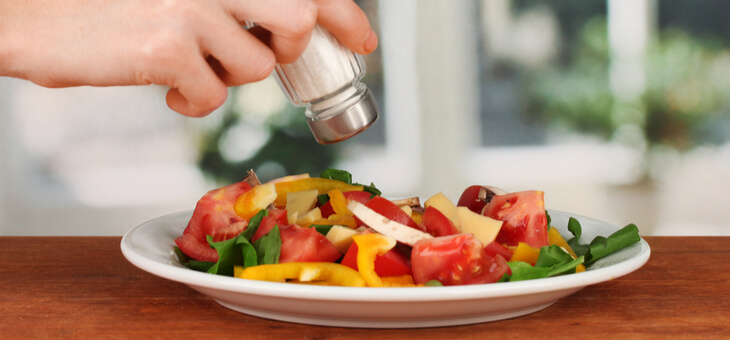Salt is one of those things we all know can be bad for us, but we can’t seem to let go of it. There’s just a certain itch the savoury mineral scratches that isn’t really satisfied by anything else.
As a nation, we can’t stop eating the stuff. And yet over-consumption of salt – or sodium chloride – can raise your blood pressure and has been linked to everything from heart disease and stroke to stomach cancer and osteoporosis.
But what if you could keep eating salt but still get a significant reduction in your risk of developing these conditions, and possibly even extend your life? You may be in luck.
A study funded by the National Health and Medical Research Council of Australia (NHMRCA) has shown that diluting the salt in your shaker with 25 per cent potassium chloride can dramatically lower your blood pressure and reduce your risk of stroke.
Read: Follow these 13 rules for a healthy heart
Potassium chloride can be bought in powdered form from most health food stores and online. It is odourless and tasteless and can slip in, undetected by your tastebuds, to regular salt.
The study looked at more than 20,000 subjects who were either over 60 or had a history of stroke. At random, participants were assigned either regular 100 per cent sodium table salt to use on their food or the 25 per cent potassium chloride mixture. Medical outcomes for the subjects were then monitored over the next five years.
Researchers were mainly monitoring for the incidence of stroke, but were also on the lookout for “major adverse cardiovascular events” and death from any cause.
The study found those using the salt substitute had a reduction in incidents of both stroke and heart attacks by around 15 per cent.
Read: Light exercise for four hours a week increases stroke survivability
Salt is possibly the most common staple found on Australian dining tables. It actually does provide some health benefits in the form of important electrolytes. But you need only a small amount, around one to two grams per day.
The Heart Foundation recommends an absolute maximum amount of five grams per day but notes that most Australians are eating almost double that at nine grams.
And it’s not just the loose salt you’re shaking on your chips. Around 80 per cent of the salt you ingest comes from processed foods, making it hard to get an accurate count of how much salt you’re truly eating.
Research from Food Standards Australia New Zealand (FSANZ) shows that many common processed foods contain a large percentage of your daily recommended salt intake in just one serving. It can be seriously difficult to get a good idea of how much salt you’re eating.
The federal government has committed to a World Health Organization plan to reduce the salt intake of the population by an average of 30 per cent by 2025. It claims we’re still on track as a nation to achieve this target on time.
Read: Are any of these foods causing your indigestion?
But the amount of salt eaten by Australians still remains alarmingly high, despite an overall reduction in salt in common food items such as margarine, savoury biscuits, packet soup and mayonnaise.
If the intake of salt remains this high on a national level, it might be time to consider introducing legislation to limit the amount of salt allowed in food.
Would you support laws to control the amount of salt in our food? Or do you think we can be trusted to watch our salt intake ourselves? Let us know in the comments section below.
If you enjoy our content, don’t keep it to yourself. Share our free eNews with your friends and encourage them to sign up.

